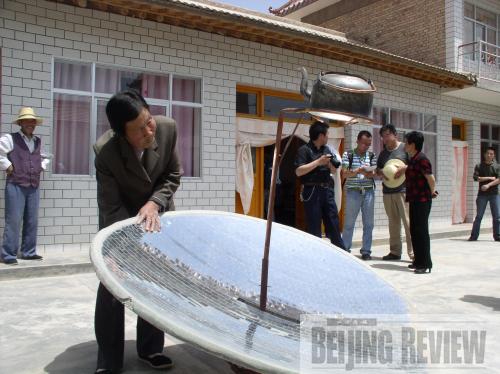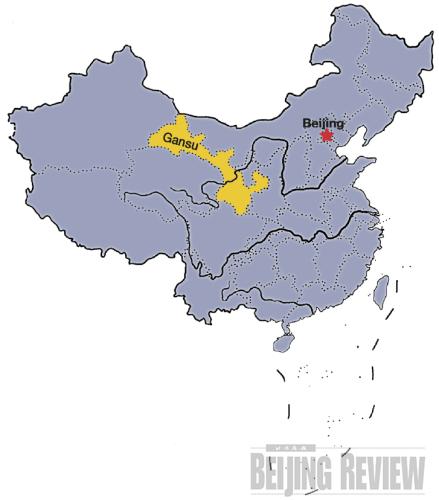|
 |
|
FREE ENERGY: A Daping villager uses a solar oven to boil water (YIN PUMIN) |

Dry air, dry land and loess hills— this is likely the first impression most people have when visiting the villages of northwest China's Gansu Province.
The province is one of China's driest, with a meager 300 mm of rain falling annually. Meanwhile, an average of 2,800 mm of water evaporates every year in the area. But it is not just a lack of water that has hampered development here. Little hydration means fewer agricultural products. Fuel is also in short supply.
 |
|
ARTIST'S LIFE: Daping farmer Ran Juying earns income by selling her paper cuttings (YIN PUMIN) |
Facing such harsh conditions, people in northwest China have found a unique way to live. The small village of Daping in Qinglanshan Township, Anding District, is one example. It is located in the mountains east of Dingxi, a city in Gansu Province.
In sharp contrast to the desolate lands surrounding it, Daping is covered by dense greenery and has rows of loft-style houses that line both sides of the village road. According to Ma Qin, a Qinglanshan Township official, villagers have built 108 such houses for the 123 families who call Daping home. Qi Yonghe, Executive Deputy Director of Anding District, said President Hu Jintao visited Daping in 1999 and 2007, giving high praise to the great changes he saw there.
Plenty from scarcity
Water is often the limiting factor in the province. For a long time, people and livestock in the rural areas had to drink filthy water.
Ran Juying, a 36-year-old Daping farmer, said villagers used to have to walk for two hours to a valley 3 km away to fetch silt-laden water.
"Today, we can get enough clean water because we have built water cellars," said Ran. Water cellars are 2-to-3-meter-deep wells connected to four or five small water channels around their mouths that extend in different directions. Rainwater caught in the channels collects in the cellar.
"In the past, the water would usually turn rancid after some time," Ran said. "But today, we do not worry about that because we have installed a water purification system in the cellar. We can drink the water directly from the cellar."
Cellars are directly connected to kitchens so that they can be used as a home's tap water, providing much more convenience.
"My family has two water cellars—one for people and another for livestock," said Ran.
Daping has built 560 water cellars, amounting to one water cellar for each person, said Qi. The village has also constructed five dams and more than 3,000 meters of agricultural channels that guarantee the irrigation of a total of 220 hectares of farmland. This infrastructure helps prevent soil erosion.
| 